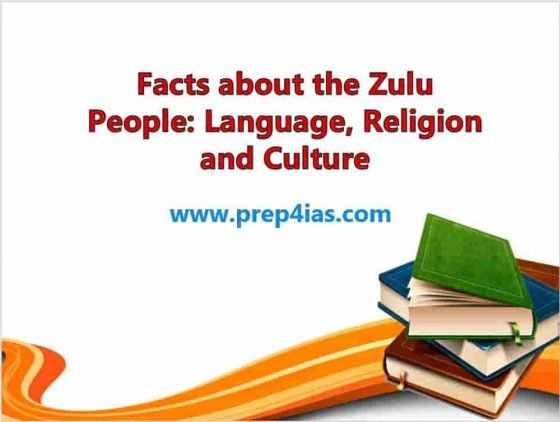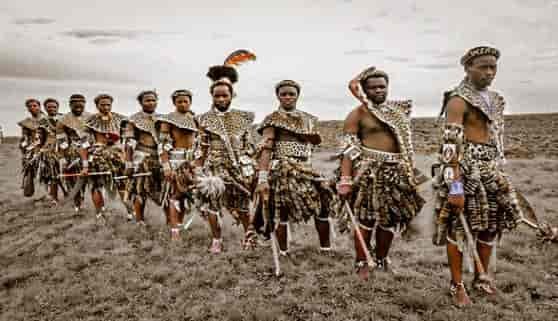The Zulu tribe is one of the most well-known tribes in Africa, owing to the pivotal role it played in the continent's history. The history of South Africa would be incomplete without mentioning the Zulu people. We will discuss some fundamental facts about the Zulu people in this topic, including their history, family structure, religion, ideas, customs, and traditions as well as a few other facts.

Facts about the Zulu People: Language, Religion and Culture
Also Read: The Origins of Agriculture: How It all Started
First, it’s crucial to understand the Zulu tribe’s history in order to comprehend the Zulu people. The Nguni people are the ancestors of the Zulus. The Nguni people moved to the east coast of Africa as part of what are known as the Bantu migrations in order to reach South Africa. As a result, a small Zulu tribe established its home in South Africa about the ninth century AD.

Because of their leader, King Shaka Zulu, the Zulus were a fierce foe during the 1800s. All the Zulu tribes were brought together under his rule, which lasted from 1816 to 1828, to form the most powerful military force in Southern Africa at the time - the Zulu Nation.
The Zulu nation ceased to exist after the death of King Shaka Zulu, who was cruelly assassinated by his brothers and was partitioned into different tribes by British colonization. The Zulu people have never reclaimed their independence until today.
Geography: Where are the Zulus ?
The KwaZulu-Natal province of South Africa, home to between 10 and 11 million Zulu people, is where the majority of Zulu people are found. Zimbabwe, Botswana, Lesotho, and Swaziland are among the nations with smaller Zulu population concentrations.
Language
IsiZulu, a Bantu language, is the Zulu people's native tongue. The Zulu language contains various respect phrases and clicks sounds. For instance, calling older individuals by their first names is viewed as showing a lack of respect! Therefore, it is considered to be good manners to address elders in the Zulu community as Baba (father) and Mama (mother) whenever possible. One of the 11 official languages of South Africa is Zulu. English, Afrikaans, Xhosa, and Portuguese are among the other languages in which many Zulus are fluent.
Holidays for the Zulus
In addition to all the South African public holidays, Shaka Day is a special day for the Zulu people. This holiday, which was renamed Heritage Day in recent years, is observed annually on September 24. King Shaka Zulu, the creator of the Zulu Kingdom, is honored on Heritage Day.
The Zulus congregate at the KwaDukuza in Stanger, where the legendary King’s tombstone is located, dressed in their traditional attire for the occasion. On Heritage Day, there is a lot of singing, dancing, and feasting to celebrate Shaka Zulu, the founder of the Zulu Kingdom, and all the succeeding kings.
Zulu Family Organization
Zulu culture is quite patriarchal. Therefore, a male is always the family’s head and primary authority. A husband, his wife or wives (if he can afford it), and their children make up the family unit. The man’s parents may occasionally make up the family unit as well, and they may end up managing the home. Men and women in the Zulu community work in different fields.
If they live in a rural region, the men are mostly in responsible of providing for the family and handling all the physical labor, such as building houses and caring for the cattle. The women, on the other hand, are in charge of all household tasks, including cooking, cleaning, and child care. In rural places, women are also in charge of harvesting and planting crops.
Nowadays, women have the same employment opportunities as males. They are still in charge of all domestic duties, though Because of this, a wife who wishes to work outside the home must either complete all of the household chores before or after her job or hire someone to do them.
Urban and Rural Zulus
The majority of Zulu people still reside in rural areas of the KwaZulu Province today. Furthermore, farming and raising animals are the main sources of their subsistence. They lack the convenience of basic utilities like power and clean water. Their homes are either rectangular or circular (rondavels). South Africa’s Kingdom of Lesotho is a mountain village and is home to the Zulu people.
They primarily employ mud or concrete blocks to construct their dwellings, which have thatched roofs made of grass or iron sheets. The majority of Zulus residing in urban areas are concentrated in the KwaZulu Province’s town of Durban. The so-called black townships established by the government in the 1950s and 1960s are where most urban Zulu may be found.
Clothing
When it comes to clothing, the Zulu people are regularly dress in western attire. Only on exceptional occasions, such as Shaka Day and at ceremonies marking passage rites is the traditional garb worn. The Amabheshu, a goatskin or cattle skin waist apron and goatskin bands on their legs and arms are part of the traditional attire for men.
The customary clothing for women, however, varies according to their marital status. If the woman is not married, she covers the front of her body with a cattle or goatskin skirt and beaded strings. When a lady is engaged, however, she usually wears a skirt and a bright piece of apparel to cover her breasts. A married woman is finally covered from head to toe in garments.
Rites, Beliefs, and Religion
a) Religion
The majority of Zulu people practice Christianity, but they also strongly believe in ancestral spirits.
b) Beliefs
There is a supreme being or creator God known to the Zulu tribes as a "Unkulunkulu" God, the creator, does not communicate with mortals. The entity that the people communicate with to assist them in coming up with solutions to their day-to-day issues is the ancestral spirit (Amadlozi). The Amadlozi can be reached through the use of divination methods. You’ll need a herbalist and a diviner to do it. The herbalist creates a combination of herbs called a muthi to affect the ancestral spirit, whereas the diviner will call the ancestral spirit.
Muthi comes in two types - black and white. The white muthi is employed to heal, protect, and influence the ancestor spirit in a beneficial manner. Black muthi, on the other hand, is used to inflict suffering. The Zulu people believe that using the black muthi to conjure spirits is what causes diseases and bad luck. The use of black muthi is consequently viewed in Zulu society as an act of witchcraft.
The Zulu tribe is renowned for its friendly and hospitable members. They are renowned for their adherence to and belief in Ubuntu, which is just the English word for humanity or good character. The Zulu people live with this humanity on a daily basis. They believe in Ubuntu because they think that humans are the most advanced species. They further support this view by having a large number of proverbs that describe appropriate and inappropriate behavior toward other people.
c) Rituals and Customs
In Zulus' life, there are four crucial stages: Birth, Puberty, Marriage, and Death. Each of these achievements is honored with a ceremony. To ensure a successful transition to the next phase of their lives, offerings and sacrifices of animals are offered to the ancestral spirits.
Conclusion
The largest ethnic group in South Africa is the Zulu. Additionally, one of South Africa's official languages is the Zulu language or isiZulu. The majority of the Zulus are still dependent on agriculture and animals for their survival, and they still inhabit rural villages in the KwaZulu-Natal region. But a lot of Zulus seeking a better way of life have opted to settle in the black townships in the city of Durban.
Even though many Zulu will claim to be Christians, many of them still firmly believe in the ancestral spirit and rely on this system of ancestor worship to assist them in finding solutions to a variety of problems in their daily lives
Bibliography
- Alex Zaloumis, Zulu tribal art, AmaZulu Publishers, Le Cap, 2000
- Canonici, Noverino. « The trickster in Zulu folktales. » Alternation 1, no. 1, 1994, p: 43–56.
- Donald R. Morris, The washing of the spears: a history of the rise of the Zulu nation under Shaka and its fall in the Zulu War of 1879, Simon and Schuster, New York, 1971, 1965
- James Anson Farrer, Zululand, and the Zulus: their history, beliefs, customs, military system, home life, legends, etc. etc., and missions to them, Kerby and Endean, Londres, 1879
- Jonathan Sutherland, Diane Canwell. The Zulu kings and their armies, Pen & Sword Military, Barnsley, South Yorkshire, England, 2004
- Josiah Tyler, Forty years among the Zulus, Congregational Sunday-school and publishing society, Boston, Chicago, 1891
- Nathaniel Isaacs, Travels and adventures in eastern Africa, descriptive of the Zoolus, their manners, customs, etc.: with a sketch of Natal, Edward Churton, Londres, 1836, vol 2.
- Vusamazulu Credo Mutwa, Zulu shaman: dreams, prophecies, and mysteries, Destiny Books, Rochester, 2003
